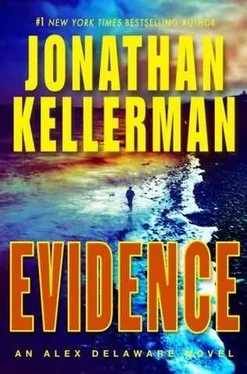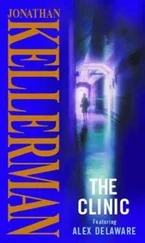“I know what you’re investigating, I just told you I heard it on the news.”
“And rushed right over.”
“Absolutely.”
“Why, Mr. Rutger?”
“Why?”
“Yes, sir.”
“Why not? Last I heard this was still a free country.”
“Mr. Rutger, this is a serious case and I don’t have time-”
“Neither do I, Officer. Why did I rush over? Because I’ve been violated . Again.”
“Again?”
“This place was mine, Officer. They took it from me. And now blood has spilled. Barbarians.”
“Tell me how they took it from you, sir.”
“Tell?” said Rutger. “I could write you a book. In fact, I’ve been thinking about doing just that. ‘Pillage of the Innocent.’ It could be a bestseller, given the way people feel about them.”
“How about a summary, Mr. Rutger?”
“Why would you want that?”
“So I can understand-”
“Fine, fine, here’s your summary: a tragedy that symbolizes everything vulgar this country has become. When I was a boy, a beautifully proportioned home sat here. A lovely Georgian Revival designed by Paul Williams. Not that you’d know who that is-”
“Top architect in the forties and fifties,” said Milo. “Black, so he couldn’t live in most of the neighborhoods where he worked.”
Rutger smoothed his tie. “Be that as it may, he knew how to design a home. My father paid for it with honest work, not by manipulating currency or money-changing or scheming.”
“What business was your father in?”
“Honest business. My sister and I grew up in bucolic splendor. Not that she cares… so what do they do? Demolish our lineage and put up that.” His chin quivered. “Visigoths.”
“You were opposed to selling DSD the property but your sister disagreed?”
Rutger glared. “Haven’t you been listening? They stole it from under me.”
“How?”
No answer.
“Sir?”
“No need to get into any of this, Officer.”
“I’d like to anyway.”
“Bully for you, but I do not wish to discuss personal matters.”
“Homicide makes everything public, Mr. Rutger.”
“That does not concern me.” More chin calisthenics. Rutger’s eyes filled with tears. Ripping the pocket square loose, he dabbed. “Blasted dust.”
I said, “You came here because you felt your family’s memory was being sullied all over again.”
Rutger stared at me. “You’re Jewish, aren’t you? My father used to play golf with Rabbi Magnin. Now, there was a shrewd man, used family money to build that temple of his. Big money, from San Francisco. His brothers were haberdashers, knew how to turn a nice profit.”
Milo said, “Are you making an actual claim of ownership to this property, Mr. Rutger?”
“I would if I could find a knight errant willing to do battle.”
“A lawyer to take your case.”
“Cowards,” said Rutger.
“Okay, sir, you need to avoid any more confrontations-hold on, let me finish. Yes, it’s a free country but freedom means responsibility. You’re an educated man, you know that.”
Rutger humphed. “Last I heard, this was still a free country.”
“Sir, this is a crime scene. No unauthorized entry will be tolerated.”
“That’s what he said-that fool in a uniform. He was rude and uncouth and I was compelled to take action.” Holding up two fists. He refolded the handkerchief, repeated until he’d produced a perfect dimple. “I’m leaving now, Officer, but I will not accept any arbitrary pronouncements banning me from my-”
“I have no objection to your driving by, Mr. Rutger. But please don’t stop and try to enter for any reason. And if you do observe something out of the ordinary, call me. Here’s my number.”
Rutger regarded the business card as if it were tainted.
“Sir?” said Milo.
“Just like that?” Rutger snapped his fingers. “You command and I obey?”
“Mr. Rutger, I’m defining limits to avoid future misunderstanding. You may drive by to your heart’s content but do not try to enter the property.”
Charles Ellston Rutger drew himself up. Jacket buttons battled his belly. “At this time, I see no reason to return.”
“Good choice, sir.”
“This is America. I don’t need you to define my choices.”
Rutger’s Town Car rumbled off, squeaking on bad bearings and belching exhaust.
Milo exhaled. “Well, that was different.”
He phoned in Rutger’s name. Several moving violations, nothing criminal. “Crazy old coot but for all his attachment to this heap, I don’t see him having the stamina to climb those stairs with a weapon, dominate, and double-murder.”
“Agreed,” I said. “And despite his age, he doesn’t sound like our tipster.”
We drove back to the station where he let Doyle Bryczinski simmer in an empty interview room and searched the county assessor for the Borodi property’s previous owners.
Only one: the Lanyard A. Rutger Family Trust, established twenty years previously. The trust had sold the place fourteen years later, the transaction handled by Laurence Rifkin, Esq., of Rifkin, Forward, and Levitsky, Beverly Hills. Their website pegged them as tax and estate lawyers.
Milo said, “Start at the top,” phoned and asked for Rifkin. A mellow baritone came on the line surprisingly quickly. “Larry Rifkin here. Police? What’s going on?”
Milo summed up.
Rifkin chuckled. “I’m not laughing about murder. I’m laughing at theater of the absurd. Good old Charlie.”
“You’ve got a history with him?”
“I can’t believe he’s still claiming he was defrauded. He was the one who pushed the sale in the first place, Lieutenant. On top of being crazy, he must be going senile.”
“So any claim of fraud is groundless.”
“Groundless? It’s insane. Here’s what it boils down to: Lanyard, their father-Charlie’s and Leona’s, that’s Charlie’s sister-made some money in manufacturing and investments but by the time he’d died, he’d lost quite a bit in the market and once debts were settled there wasn’t much estate left. You know the rich, my treasures, your junk? Paintings Charlie thought were priceless turned out to be piddling, same for a bunch of supposedly rare books that weren’t first editions. The only sizable asset was residential real estate: three houses, worth maybe five mil at the time. The place on Borodi was the biggest-ticket item. Lan built it back in the forties, got Paul Williams to design, the place was gorgeous. There’s also a chalet-type weekend place with a dock on Lake Arrowhead, and a three-acre spread in Palm Springs. Lan died ten years ago, made it to ninety-one, but Barbara-his wife-died when she was much younger, so everything went to the kids. Leona’s a doctor, oncologist, lovely lady. Lan was a perceptive man and named her the executor. Technically, that was logical but it accomplished the obvious.”
“Family strife.”
“Charlie strife. We-my dad was still alive, headed the firm-tried to talk Lan out of designating Leona, suggested we should execute. Or Lan could find someone at one of his banks. He wouldn’t hear of it.”
“And Charlie went ballistic.”
“Nuclear. Pitting one sib against the other is always a disaster and these sibs never had much in common to begin with. Not that Leona didn’t try to make nice with Charlie. You won’t meet a more reasonable human being. But Charlie’s another matter, you don’t need to be a psychologist to see why he resents Leona. She’s everything he isn’t: smart, accomplished, happily married, a gem.”
“Charlie never got it together.”
Читать дальше












